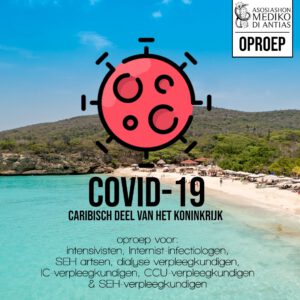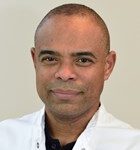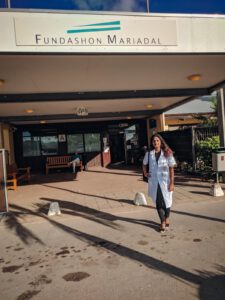ZOETERMEER – Vereniging Antilliaanse Medici (AMA) received 80 registrations from medical staff with a Caribbean background in the Netherlands to help on the islands. Yet the islanders weren’t considered by the Dutch ministry when they were choosing the members of the crisis team that was heading to Curaçao. They did however choose medical staff from the United States of America. Why is this?
Thaïs Tong, chair of the AMA says that they were in contact with the governments of all the islands and with the Dutch Ministry of Health, Welfare, and Sport (VWS). “There was an enthusiastic response and we let the islands decide what kind of help they deemed necessary.”
Need in the Netherlands
Nevertheless the 80 registrations provided by the AMA were not taken into account by the Dutch ministry of Health (VWS) when they were assembling the crisis team. Why not? “An emergency solution was decided upon with an IC team from America”, says a spokesperson for the ministry. “We also didn’t want to compete with the need for physicians in the Netherlands.”
Tong understands this but says that the chance that a lot of physicians would’ve been taken away is small. This is also due to the fact that the medical staff who registered with the AMA are spread out throughout the Netherlands. “The operations on the islands are on a smaller scale compared to the Netherlands. The severity of the outbreak also differs per island.” In the meantime the AMA has called upon Caribbean IC physicians and nurses this week at the request of the VWS.
Lack of cooperation
According to pulmonary physician Johnny Daflaar there’s a lack of cooperation when it comes to medicine within the Kingdom. Daflaar has been working for more than twenty years in the Netherlands and has been keeping a close eye on the medical care provided on his birth island. He is also willing to help on his island. “The hospital in Curaçao used to work closely with the Netherlands. There’s a lack of a long term structure at the moment.”

The post which AMA shared on social media during the week at the request of the Ministry of Health (VWS)
More possibilities in the past
Daflaar has been linked to the HagaZiekenhuis in the Hague for more than twenty years. He has also been working at the Langeland hospital in Zoetermeer since 2007 where he helped set up the pulmonary department. During the 90’s he worked for two years at the Sint Elisabeth hospital in Curaçao. “I learned a lot during my time there. There were a lot of possibilities for residents and fellows could complete a part of their fellowship program on the island. You could also work at the hospital on Bonaire. There was a good system in place.”
According to the pulmonary physician, the system has broken down due to different reasons, but it can mainly be attributed to the financial situation on the island. “It wasn’t part of the backbone of the institution and it relied on a few fanatics. A bridge needs to be built for young Caribbean physicians who study in the Netherlands. A full-fledged program cannot be achieved, but a partial one could work. This would build a better bond between young physicians and the islands and help with the healthcare provided on the island.”
 Pulmonary physician Johnny Daflaar Working with COVID-19 patientsDaflaar treated his first corona patient at the beginning of March. There are mostly ‘young’ patients on his IC. “The average age is 55 years. That’s why the number of individuals who pass away here might be relatively low.” According to the pulmonary physician the focus at the moment lies mostly on testing existing medications, that could work on patients who have COVID-19. That’s why he and his colleagues collect a lot of data. |
Improved communications
Farahnaz Ramzan (27), a Bonarian, works as a ward physician on the pulmonary ward with Dalfaar at the Langeland hospital. Ramzan is an active member of the Vereniging Antilliaanse Medici (AMA). If it were up to her, she would be working on the islands within ten years. But according to her this is difficult: “you have to do a fellowship in the Netherlands. I thought about doing a residency in Curaçao, but the hospital on the island only has a partnership agreement with the University of Groningen.”

Farahnaz Ramzan during her residency program on Bonaire – Picture: Private collection
Ramzan was however to first resident at the hospital on Bonaire to complete part of their residency program there. She worked on the gynecology department. “Everything’s on a smaller scale there and there are less resources”, says Ramzan. She believes that the Netherlands should pay more attention to the medical care on the islands. Bonaire is a special municipality of the Netherlands, meaning that the Dutch government is responsible for the medical care on the island. Bonaire has two confirmed cases of the corona virus.
“It’s hard to get all the resources and treatments on the islands. I do believe that care facilities need to be able to maneuver more quickly and that an improved communication structure is needed. A lot of patients are flown to Colombia for treatment, but the language barrier (Spanish) can create a problem. Why aren’t these cases solved within the Kingdom?”
More fellowships needed
Ramzan wants to do as much as possible for the islands, even though she can’t complete a fellowship there. “That’s why I’m a member of the Advisory Board of the AMA. We want to create more fellowships on the islands.”
About the AMA and cooperation within the KingdomAsosiashon Mediko di Antias (Vereniging Medici van de Antillen) was founded in 2017. The association wants to create and facilitate fellowships for physicians (in training) with a Caribbean background, who want to move back or contribute something to their home islands. They want to invest in a new generation of healthcare professionals and prevent the brain drain. At the moment the association has more than two hundred members, consisting of residents, fellows, PhD students, pharmacists, and (bio)medical students, all of them with a Caribbean background. |



